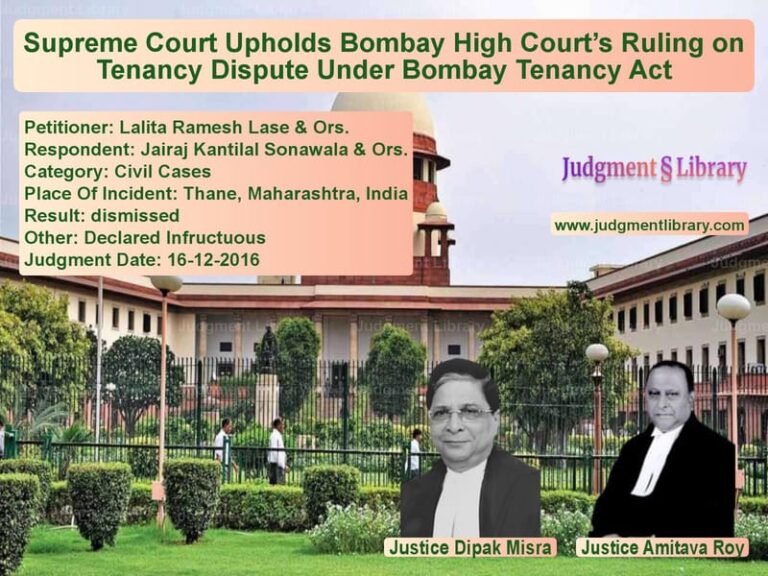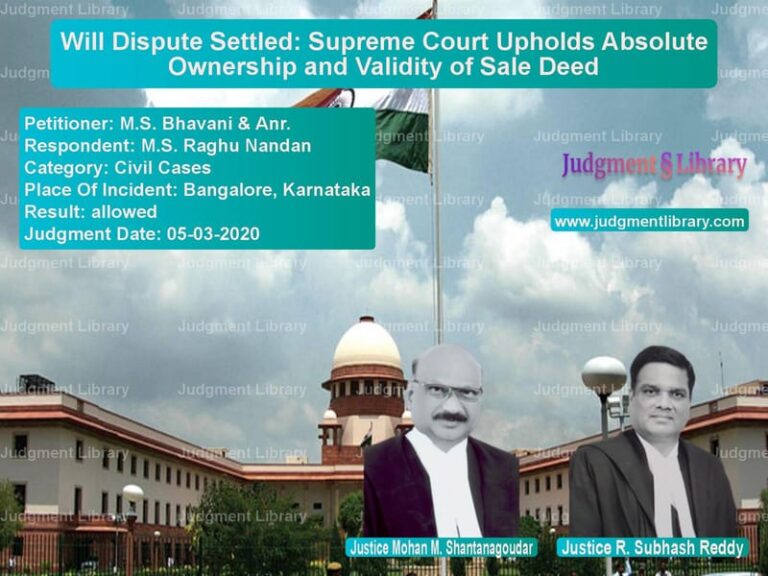Supreme Court Ruling on Amendment in Domestic Violence Act Cases
The Supreme Court of India in Criminal Appeal No. 516 of 2016 dealt with an important issue regarding the amendment of petitions under the provisions of the Domestic Violence Act, 2005 (DV Act). The case was filed by Kunapareddy @ Nookala Shanka Balaji (Appellant) against Kunapareddy Swarna Kumari & Others (Respondents). The primary issue for consideration was whether a court dealing with a Domestic Violence case had the power to allow amendments to the petition or complaint that was originally filed.
Background of the Case
The respondent, Swarna Kumari, wife of the appellant, had filed a petition under the DV Act in 2008, claiming various allegations of physical and mental harassment, including dowry demands and being driven out of the matrimonial home. In her initial petition, she sought protection and monthly maintenance for herself and her children. The petition also included other reliefs under the provisions of the DV Act. However, as the case progressed, she sought to amend the petition to add further reliefs and increase her maintenance demand. This amendment was challenged by the appellant, who argued that there was no provision in the DV Act allowing such amendments.
Petitioner’s Arguments
The appellant contended that:
- The DV Act does not provide for amendments to petitions or complaints under the provisions of the Code of Criminal Procedure (CrPC).
- The Trial Court erred in permitting an amendment to the petition when the DV Act does not explicitly allow such amendments.
- Allowing the amendment would change the nature of the case and lead to unnecessary delays and confusion.
Respondents’ Arguments
The respondents argued that:
- The amendment was necessary due to the escalation of circumstances in the case, such as increased financial needs and the request for additional reliefs, including compensation for mental harassment and return of dowry items.
- Amendments in petitions under the DV Act are permissible as the DV Act is a civil law aimed at protecting women, and such amendments are needed to serve the justice process effectively.
- The Trial Court’s decision to allow the amendment was in line with the provisions of the DV Act and should not be interfered with.
Judgment
The Supreme Court, after hearing both sides, discussed the relevant provisions of the Domestic Violence Act, particularly Section 28, which governs the procedure for Domestic Violence cases. The Court noted:
“The intention of the law is to provide a remedy that combines civil rights for women, addressing domestic violence, which is not covered by traditional civil law mechanisms. The law aims to protect women from violence within the family.”
The Court referred to its previous judgments and the provisions of Section 28 of the DV Act, which governs the procedure for domestic violence cases:
“Save as otherwise provided in this Act, all proceedings under sections 12, 18, 19, 20, 21, 22 and 23 and offences under section 31 shall be governed by the provisions of the Code of Criminal Procedure, 1973 (2 of 1974).”
The Court emphasized that while proceedings under the DV Act are civil in nature, they are also governed by the CrPC for procedural purposes. The Court observed:
“Merely because Section 28 of the DV Act provides for that the proceedings under some of the provisions including Sections 18 and 20 are essentially of civil nature, it cannot be said that the Court has no power to allow amendments in the petitions under the DV Act.”
The Court cited the example of maintenance petitions under Section 125 of the CrPC, which are of a civil nature but still allow amendments. Therefore, the Court concluded that the Trial Court had the jurisdiction to allow amendments in a Domestic Violence case, provided that the amendment was necessary for the proper determination of the matter and to prevent multiplicity of litigation.
Key Takeaways
- Court proceedings under the Domestic Violence Act are primarily civil in nature, but they are governed by the procedural provisions of the Code of Criminal Procedure.
- Amendments in Domestic Violence cases can be allowed if they are necessary for the fair and complete determination of the case.
- The ruling reinforces the principle that the legal process must be flexible enough to ensure justice for the aggrieved parties, particularly in domestic violence cases.
The Supreme Court’s ruling highlights the need for judicial flexibility in dealing with amendments to petitions in Domestic Violence cases, ensuring that justice is not hindered by rigid procedural constraints.
Don’t miss out on the full details! Download the complete judgment in PDF format below and gain valuable insights instantly!
Download Judgment: Kunapareddy @ Nookal vs Kunapareddy Swarna K Supreme Court of India Judgment Dated 18-04-2016-1741854772834.pdf
Direct Downlaod Judgment: Direct downlaod this Judgment
See all petitions in Domestic Violence
See all petitions in Alimony and Maintenance
See all petitions in Judgment by A.K. Sikri
See all petitions in Judgment by Rohinton Fali Nariman
See all petitions in dismissed
See all petitions in supreme court of India judgments April 2016
See all petitions in 2016 judgments
See all posts in Criminal Cases Category
See all allowed petitions in Criminal Cases Category
See all Dismissed petitions in Criminal Cases Category
See all partially allowed petitions in Criminal Cases Category







